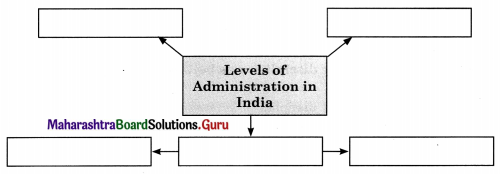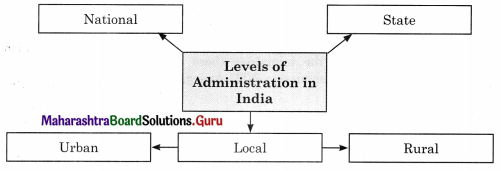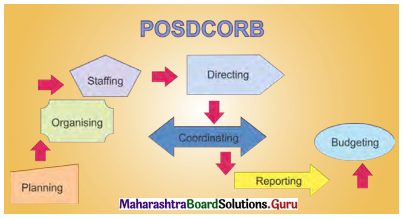Balbharti Maharashtra State Board Class 11 Political Science Important Questions Chapter 7 Public Administration Important Questions and Answers.
Maharashtra State Board 11th Political Science Important Questions Chapter 7 Public Administration
1A. Choose the correct alternative and complete the following statements.
Question 1.
Civil Service/Bureaucracy refers to the _____________ executive. (political, temporary, statutory, permanent)
Answer:
permanent
Question 2.
_____________ is also called ‘government in action’. (Federalism, Public Administration, Centralization, Dyarchy)
Answer:
Public Administration
![]()
Question 3.
In a narrow perspective, focus is only the _____________ branch of the government. (legislature, judiciary, executive, collector)
Answer:
executive
Question 4.
_____________ is the premier policy ‘Think Tank’ of Government of India at present. (Planning Commission, NITI Aayog, Election Commission, Comptroller, and Auditor-General)
Answer:
NITI Aayog
Question 5.
India’s central recruiting agency for All-India Services is the _____________ (UPSC, NITI Aayog, HRD Ministry, Finance Ministry)
Answer:
UPSC
Question 6.
Public Administration as academic discipline originated in _____________ (Germany, USA, UK, France)
Answer:
USA
Question 7.
Arthashastra influenced administration during the reign of _____________ (Vikram Aditya, Chandragupta Maurya, Aristotle, Emperor Akbar)
Answer:
Chandragupta Maurya
Question 8.
Gram Panchayats are headed by a _____________ (Sarpanch, Minister, Tehsildar, Gram Sevak)
Answer:
Sarpanch
1B. Identify the incorrect pair in every set, correct it and rewrite.
Question 1.
(a) Rural areas – Gram Panchayat
(b) Urban areas – Municipal Corporations
(c) Military areas – Town Area Samitis
Answer:
Military areas – Cantonment Boards
![]()
Question 2.
(a) Cameralism – George Zincke
(b) Modern Public Administration – Woodrow Wilson.
(c) Adnyapatra – Emperor Akbar
Answer:
Adnyapatra – Chhatrapati Shivaji Maharaj
1C. State the appropriate concept for the given statements.
Question 1.
Science of management as applied to affairs of the state.
Answer:
Public Administration
Question 2.
The step-in administration involves preparing a blueprint.
Answer:
Planning
Question 3.
A new approach to understanding complex government activities.
Answer:
Public Policy
1D. Answer in one sentence.
Question 1.
What is the function of the Union Public Service Commission (UPSC)?
Answer:
Union Public Service Commission (UPSC) is India’s central recruitment agency which is responsible for conducting examinations and recruitment for All India Services and Group A, B of Central Services.
Question 2.
What approach has the NITI Aayog adopted?
Answer:
It has adopted a bottom-up approach where planning begins at the grassroots (local) level and then reaches to the top level.
Question 3.
Why is Coordination important in administration?
Answer:
Coordination helps in eliminating any overlapping of work and prevents conflict of responsibility.
![]()
Question 4.
Write four specialized functions of the government.
Answer:
Providing education, ensuring public health, promoting agriculture, providing social security are some specialized functions of the government.
Question 5.
Which Public Policy aims to electrify rural India?
Answer:
Rajiv Gandhi Grameen Vidyutikaran Yojana aims to electrify rural India.
Question 6.
Write some important administrative acts given by the British.
Answer:
Indian Councils Act (1909), Government of India Act (1919) Government of India Act (1935), Local Self Government Act.
Question 7.
What is meant by political neutrality?
Answer:
All civil servants owe allegiance only to the constitution and not to any political party. This is political neutrality.
1E. Complete the following sentences by using the appropriate reasons.
Question 1.
Reporting is important in public administration because
(a) it ensures accountability and responsibility within the administration.
(b) it ensures proper recruitment and training.
(c) it prevents jurisdictional conflict.
Answer:
(a) it ensures accountability and responsibility within the administration.
![]()
Question 2.
NITI Aayog is called the ‘Think Tank’ of the government because
(a) it carries out specialized government functions.
(b) it designs strategic and long-term programmes for the Government of India.
(c) It recruits civil servants for administration.
Answer:
(b) it designs strategic and long-term programmes for the Government of India.
1F. Find the odd word in the given set.
Question 1.
Mayor, Sarpanch, Tehsildar, Gram Sevak.
Answer:
Mayor (from urban administration)
Question 2.
Staffing, Directing, Budgeting, CSR.
Answer:
CSR (not included in POSCORB)
2A. State whether the following statements are true or false with reasons.
Question 1.
Civil Servants must follow the principle of political neutrality.
Answer:
This statement is True.
- Civil Service (Bureaucracy) is called the permanent or non-political executive which carries out the implementation of government policy.
- Personnel owes allegiance to the constitution and not to the party in power or to any other party. This is called political neutrality.
Question 2.
NITI Aayog is identified as the ‘Think Tank’ of the government of India.
Answer:
This statement is True.
- The National Institution for Transforming India (NITI Aayog) was established on 1st January 2015 to provide directional and policy inputs to the government.
- NITI Aayog designs strategic and long-term policies and programmes as well as provides relevant technical advice to both the Union as well as State governments.
![]()
Question 3.
Coordination is an important step in public administration.
Answer:
This statement is True.
- Gullick and Urwick explained the scope of public administration by the acronym POSDCORB. i.e., planning organization staffing, directing, coordinating, reporting and budgeting.
- Co-ordination involves an interrelation of the different branches and sections of administration to eliminate overlapping and duplication of work.
Question 4.
Corporate Social Responsibility (CSR) has great significance today.
Answer:
This statement is True.
- The broad perspective of public administration views it as a cooperative group effort, engaged in collaborations with private groups in providing basic services to the community
- CSR means that companies try to integrate social and environmental concerns into their operations as a way to contribute to society. These activities include activities like disaster relief, limiting pollution, social awareness, and educational programmes.
2B. Complete the concept maps.
Question 1.

Answer:

![]()
Question 2.

Answer:

3. Answer the following.
Question 1.
Explain the meaning of Public Administration.
Answer:
Public Administration is a subdiscipline of Political Science. It focuses on ‘government in action’ i.e., implementation of government decisions, policies, and programmes in fields of social security and welfare, law and order, transport and communication, health and sanitation, etc.
The executive branch of government consists of the Political Executive (council of ministers) and Permanent /Non-political Executive or Bureaucracy.
Public Administration as a subject studies the activity and process of the government.
According to Waldo, ‘Public Administration is the art and science of management as applied to the affairs of the state’.
Public Administration broadly includes the following:
- Activities of all three branches of government, especially that of the executive branch.
- Non-political public bureaucracy operating in a political system.
- Management of public affairs and policy execution.
- Concerned with public welfare and hence provides service and regulatory functions to the people to attain a good life.
![]()
Question 2.
How did the discipline of Public Administration evolve?
Answer:
Since ancient times, various thinkers have contributed to administrative thought and practice e.g., Kautilya’s ‘Arthashastra’ (a text on administration and political economy), Aristotle’s ‘Politics’ (in ancient Greece), and Machiavelli’s ‘The Prince’ (in Medieval Italy).
In the 18th century, Cameralism in Germany and Austria was concerned with the systematic management of governmental affairs. It stressed descriptive studies of the structure and procedures of public administration as well as the professional training of public officials. George Zincke was the most distinguished scholar of this group.
Public administration as a separate subject of study originated in the USA mainly due to factors like-
- Large scale organisations that arose due to industrialization
- Scientific Management Movement by Taylor.
- The emergence of a welfare state where the government had to perform a variety of functions.
Woodrow Wilson’s celebrated essay ‘The Study of Administration’ (1887) laid the foundation for the systematic, separate study of public administration. He is regarded as ‘The Father of Public Administration’. He advocated politics administration dichotomy i.e., separation of administration from politics, according to him politics is concerned with policy-making while the administration is concerned with the implementation of policy decisions, Wilson emphasized the need to increase government efficiency.
Today, the subject matter of public administration has expanded to include areas like comparative studies, public policy, new public management, and good governance.
Question 3.
Explain Corporate Social Responsibility.
Answer:
Companies try to integrate social and environmental concerns into their business operations. Corporate Social Responsibility (CSR) is not charity but a way to improve society. CSR activities include work like limiting pollution, disaster relief, clean water, and educational programmes in developing countries, etc.
4. Observe the given image and write in brief about it.

Answer:
In a narrow sense, it focuses on those aspects of administration that are related to only the executive branch of the government. This view was given by Gullick and Urwick in their famous acronym POSDCORB.
P-Planning: The first step in administration is planning where a broad outline or a blueprint is prepared. This happens at all three levels: National, State, and Local, For instance, the NITI Aayog has adopted a bottom-up approach where planning begins at the grassroots level and then reaches the top.
![]()
O-Organisation: The planned objectives and goals are achieved by establishing the formal structure of authority through which the work is arranged, defined, and coordinated. For example, All India Services, Central, State, and Local Services.
S-Staffing: Human resources are the backbone of any administrative system. The personnel who actively engage in the process of administration are to be recruited and trained. It is also important to maintain favorable working conditions for them. For example, recruitment through UPSC.
D-Directing: Administration is a continuous activity. Therefore making decisions and embodying them in specific and general orders and instructions is also necessary.
CO-Co-ordination: Administration is a complex and interrelated process hence different parts of organisation such as branches, divisions, sections need to be coordinated. This helps in the elimination of overlapping work and prevents conflict.
R-Reporting: Information related to the ongoing or completed task and its reporting to higher authorities is a key aspect of administration. This ensures accountability and responsibility within the administration.
B-Budgeting: Finance is a key aspect of any activity. Therefore accounting, fiscal planning, and its control are maintained through budgeting.